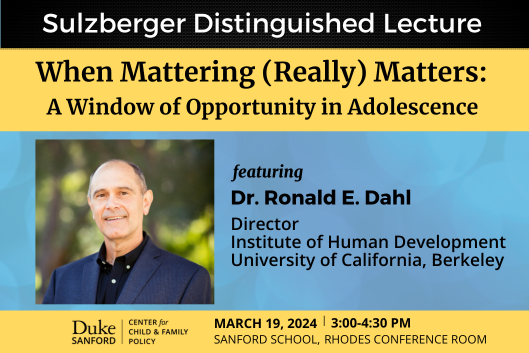
A fundamental motivation in human development is wanting to feel recognized, appreciated, and capable of actions that benefit others. These motivations begin in childhood but are amplified in adolescence. This motivation (to ‘matter’ and to feel that one’s actions matter to others) can exert a strong influence on behavior as young adolescents explore and learn how to navigate increasingly complex and uncertain social environments. This creates a formative period of social learning that can shape identity development. Understanding this sensitive period of learning has implications for early intervention strategies to impact trajectories of behavioral and emotional health and social development.
Ronald E. Dahl is the director of the Institute of Human Development at the University of California, Berkeley, where he also serves as a professor in the School of Public Health and the Joint Medical Program and runs the Adolescent Research Collaborative. He is the founding director of the Center for the Developing Adolescent, where he provides the strategic vision for the Center’s research agenda. He is a pediatrician and developmental scientist with long-standing research interests in the development of sleep/arousal regulation, affect regulation, and the development of behavioral and emotional disorders in children and adolescents.
His current work focuses on adolescence as a developmental period with unique opportunities for early intervention in relation to a wide range of behavioral and emotional health problems. His research is interdisciplinary and bridges basic developmental research (emphasizing social and affective neuroscience) and the translation of this work into clinical and social policy relevance. He has published extensively on child and adolescent development, sleep disorders, behavioral/emotional health in children, adolescent brain development and the policy implications of this work. He has been elected as a fellow of several organizations, including the Association for Psychological Science, American Academy of Pediatrics, New York Academy of Sciences, and American Academy of Sleep Medicine. He is also a founding editor of the journal Developmental Cognitive Neuroscience and is past president of the Society for Research in Child Development.
This lecture is made possible through an endowment from the Arthur Sulzberger Family. Please join us for a reception following the talk.
Click here for directions to the Sanford School. Visitor parking is available at the Science Drive visitor’s lot, a short walk from the Sanford School. The rate is $2 per hour.